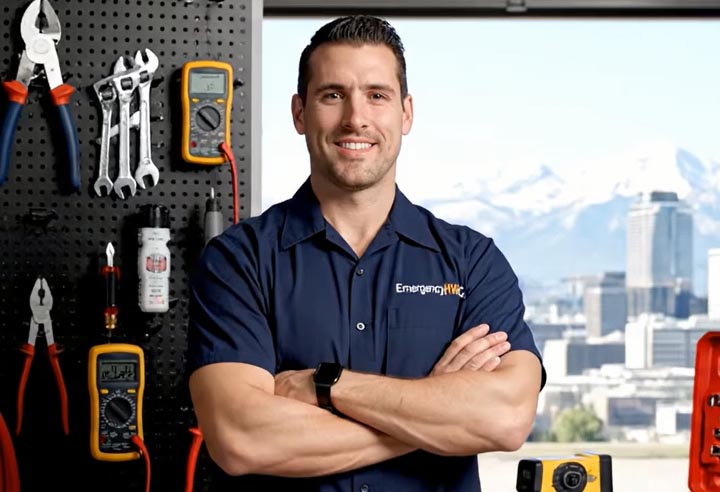What Makes Denver’s Water Heaters Fail Faster
Hard-minerals, mile-high air density, and 40°F winter inlet water put more stress on tanks and tankless units in Capitol Hill or Cherry Creek than in most U.S. cities. Add wildfire soot that clogs air intakes, and Denver homeowners need altitude-trained, code-compliant specialists, not generic plumbers.
Denver Tankless & Heat Pump Water Heaters: Advanced Solutions
Tankless and heat pump systems thrive in Denver homes because they save energy and space. Proper installation means upsized gas lines (for tankless), altitude-adjusted venting, and freeze-protected condensate routes for longer life in the Mile High climate. Network professionals provide all required upgrades so your investment performs reliably.
Emergency Water Heater Repair Denver CO: 24/7 Service
When your water heater fails during a Denver cold snap, you need immediate response: same-day dispatch, leak mitigation, temporary heating solutions, and replacement options when repair isn’t viable.
Typical Denver emergency repair prices
- Heating element or thermostat: $150-$200
- Sediment flush & treatment: $100-$175
- T&P or pressure-relief valve: $150-$200
- Anode-rod swap (tank life-saver): $250-$300
- Gas control valve / pilot assembly: $300-$500
Altitude diagnostics include flue-gas analysis and manometer gas-pressure checks to correct 12-16% derating at 5,280 ft.
Emergency Service Coverage for All Denver Neighborhoods
We connect you with rapid-response specialists who serve Capitol Hill, Park Hill, Highlands, Cherry Creek, Congress Park, Washington Park, Stapleton, Central Park, and all adjoining metro areas. No job is too small or complex, so every Denver homeowner receives priority help during outages and emergencies.
- Complete hot water failure during winter or sub-zero nights
- Tank, valve, or line leaks with risk of flooding
- Gas smells, overheating, or abrupt noises in your system
- Frozen pipes from altitude-induced cold snaps
Professional Installation & Code-Required Replacement
| System | Installed cost* | Lifespan | Denver-specific upgrades |
|---|---|---|---|
| 40–75 gal tank | $1,200 – $3,500 | 8–12 yrs | Expansion tank, seismic strap, altitude derated burner |
| Tankless | $2,500 – $7,000 | 15–20 yrs | ¾-in gas line, high-alt vent kit, condensate drain heat-trace |
| Heat-pump hybrid | $2,000 – $4,600 | 10–15 yrs | Freeze-protected condensate line, dedicated 240V circuit |
*Includes Denver permit ($75-$150) and old-unit haul-away.
When replacement beats repair
- Unit > 8 yrs and leaking or corroded
- Repair quote > 50% of new install cost
- Repeated pilot outages or rising energy bills in last 12 months
Denver-Only Permits, Codes & Rebates
We guide Denver homeowners through connections with professionals who navigate every step to maximize rebates, including federal tax credits ($600–$2,000), Colorado heat pump credits, and Xcel Energy incentives up to $1,100. Connected specialists confirm eligibility and prepare the paperwork, so you get the full savings and speedier installation.
- Mechanical + plumbing permit & final inspection required.
- High-altitude orifice kit and combustion test on every gas unit.
- Seismic strapping mandatory; expansion tank on all closed-loop systems.
- Incentives: Xcel Energy $400-$1,000, Denver CARE $500 for heat-pump units, 30% federal IRA credit (up to $2,000).
Maintenance That Extends Life in Mineral-Rich Denver Water
Network maintenance plans go beyond annual flushes: connected professionals audit electrical systems, check for freeze risks, perform combustion/gas calibrations, and test all safety controls. Critical repairs (thermostat, pressure valve, wiring) always meet Denver’s strict codes.
- Annual flush & sediment purge. It prevents rumbling and capacity loss.
- Anode-rod check every 3–5 yrs. It combats Denver’s 25-90 ppm hardness.
- FVIR or intake screen cleaning especially after wildfire smoke events.
- Combustion analysis & gas-pressure reset for altitude accuracy.
Troubleshooting Chart for Denver Homeowners
| Symptom | Likely cause | Professional fix |
|---|---|---|
| Rumbling / popping | Mineral scale on tank bottom | Power-flush + descaler |
| Pilot won’t stay lit | Low draft, clogged screen, high altitude gas mix | Clean intake, adjust gas valve, verify flue |
| T&P valve dripping | Closed system pressure spike | Install/replace expansion tank |
| Error code 11 (tankless) | Insufficient gas flow at altitude | Upsize line, adjust manifold pressure |
| Rust-colored water | Exhausted anode rod / tank corrosion | Replace rod or recommend new tank |
FAQs
How much does Denver water-heater repair cost?Most fixes run $150-$500; altitude and hard-water damage can raise costs. Get an up-front quote.
How to repair electric hot water heater?Always switch off power at the breaker before attempting any repairs. Denver’s codes require licensed technicians for thermostat or heating element work. DIY flushing is safe, but all electrical repairs should be done by a certified pro. Ask us for a quick consult.
How to repair hot water heater?Water heater repair services require proper diagnosis to identify the root cause. Common Denver issues include sediment buildup from hard water (causing popping noises), thermostat problems from altitude effects, and accelerated corrosion. While homeowners can perform basic maintenance like flushing tanks, repairs involving gas lines, electrical components, or pressure systems require licensed professionals to ensure safety and code compliance.
Flush frequency?At least yearly; bi-annual if hardness > 120 ppm or you hear rumbling.
Tankless or tank?Tankless saves space and energy but needs gas-line/vent upgrades; traditional tanks cost less up front.

